China's Reaction to Singer's Video Indicates Limits to its Relationship with Russia
Wang's performance at the ruins of Donetsk Academic Regional Drama Theatre shows how the CCP will impose limits on its relationship with Russia if it jeopardizes its wider narratives.
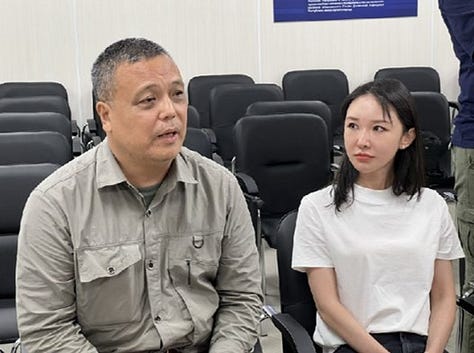
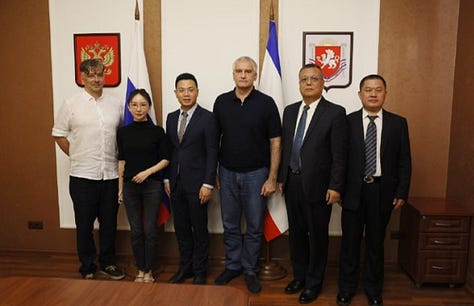
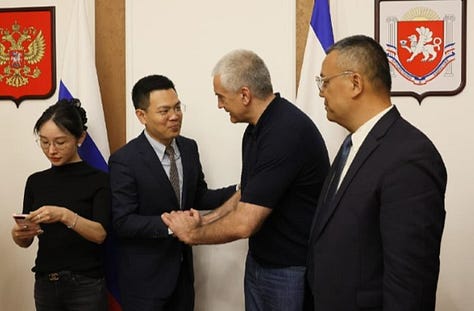
In early September, Wang Fang 王芳, her husband Chinese nationalist and pro-Beijing blogger Zhao Xiaoping 周小平, and other Chinese bloggers traveled to the Donetsk region and Crimea met with several officials.
In early September, Wang Fang 王芳, her husband Chinese nationalist and pro-Beijing blogger Zhao Xiaoping 周小平, and other Chinese bloggers traveled to the Donetsk region and Crimea met with several officials. Wang is a Chinese opera singer famous and promoted by the Chinese Communist Party (CCP) for singing pro-Party ‘red’ opera songs. She is also famous for being Zhao’s wife and taking part in some of his videos and other social media posts he creates promoting various pro-CCP narratives. During the visit, the group also visited the city of Mariupol, which was captured by Russian forces after a three-month siege in early 2022. Zhao filmed Wang as she sang the Soviet-era song “Katysuha” during the group’s visit to the Donetsk Academic Regional Drama Theatre.
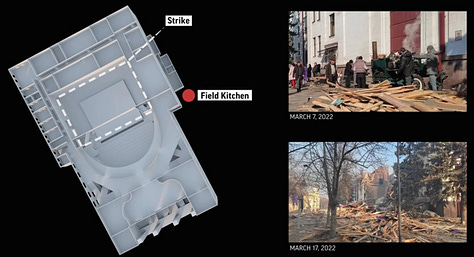


Donetsk Academic Regional Drama Theatre Airstrike
Ukrainian authorities used the theatre as the city’s main bomb shelter during the siege’s early stages in March, where approximately 1,200 civilians hid from the fighting. Theatre employees eventually painted the Russian word for ‘Children’ дети at the front and back of the building big enough that lettering could be viewed on satellites.
Ukrainian authorities used the theatre as the city’s main bomb shelter during the siege’s early stages in March, where approximately 1,200 civilians hid from the fighting. Theatre employees eventually painted the Russian word for ‘Children’ дети at the front and back of the building big enough that lettering could be viewed on satellites. On March 16th, the Russian military struck the building with an airstrike at approximately 10am, hitting the domed ceiling located directly under the stage and the field kitchen local directly outside. The explosion caused most of the ceiling to collapse and destroying the third, second, and some of the first floors. However, the basement – which served also served as living space for civilians – was largely untouched by the bombing, it was covered with rubble, killing or trapping several hundred civilians.
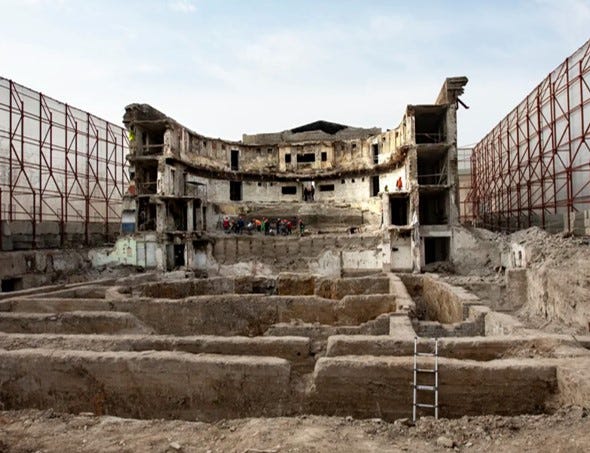
While there are no reliable number of casualties caused by the bombing, the strike likely caused around 600 casualties, including children. The Russian at firs said they did not conduct any airstrikes or shelling in Mariupol on March 16th. They then backtracked and said they targeted the theatre because the Ukrainian military used it as a major base that housed several hundred Ukrainian military personnel. The Russian military also said the Azov Battalion also took the civilians hostage and then blew up the building as a false flag attack. They also said the Ukrainian military demolished the building to make it look like a Russian airstrike destroyed the building. However, Russian and city authorities destroyed most of the building while leaving the front façade intact. Russian authorities said the demolition was part of its plan to eventually rebuild the theatre. However, city authorities opened the destroyed building to the public as a tourist attraction and allowed them to walk around the theatre’s grounds.
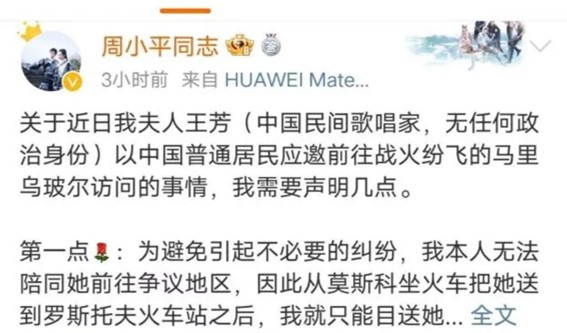
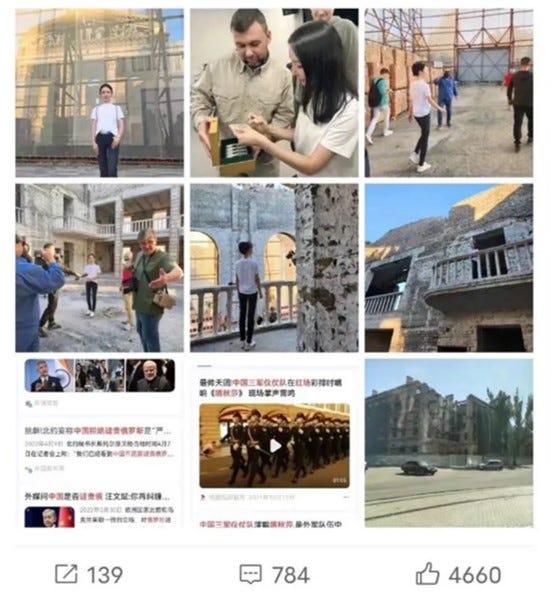
Wang’s Performance and Reaction
During the Chinese blogger’s trip, they visited the city of Mariupol and visited several sites, including the now destroyed Donetsk Academic Regional Drama Theatre. Wang sang a Chinese version of the Soviet-era song “Katyusha” in the upper part of the building while Zhao filmed her.
During the Chinese blogger’s trip, they visited the city of Mariupol and visited several sites, including the now destroyed Donetsk Academic Regional Drama Theatre. Wang sang a Chinese version of the Soviet-era song “Katyusha” in the upper part of the building while Zhao filmed her. They posted the video to both Chinese and Russian social media that was also spread by Pro-Russian and separatist accounts. The song is associated with the Soviet Union’s participation in World War II as it fought against Nazi Germany and allies espousing fascist ideology such as Italy and Romania. The Ukrainian government reacted very negatively to the video, sending a formal request for China for an explanation about the group’s visit and how they entered the occupied areas. A Foreign Ministry Spokesperson said Wang’s performance at the place where the Russian military killed approximately 600 civilians is an example of ‘complete moral degradation.’
The Ukrainian government began efforts to restrict the entry of Chinese tourists into the country as a reaction to Wang’s performance. Furthermore, the advisor to the exiled mayor posted the video to his Telegram page saying ‘haven’t there been any dances on the graves of Mariupol’s residents for a long time? Here you are.’ He further said that Russian authorities invited Wang, a famous Chinese opera singer that not even Google recognizes her, to Mariupol where she performed “Katyusha” in the theatre’s ruins. The advisor said he hoped the spirits of the civilians who died during the airstrike liked the performance so much that they will haunt her for the rest of her life.
Chinese citizens reacted negatively to the film, with some saying that she did it to ‘please herself’ and embarrassed China diplomatically. Hu Xijin 胡锡进, another pro-Beijing commentator and former Global Times editor, said he disapproved of Wang’s singing “Katyusha” at the theatre. Chinese authorities also reacted negatively to the Wang’s performance by deleting the post and associated news articles about it from the Chinese Internet shortly after the incident. Authorities also erased hashtags related to the incident such as ‘Wang Fang Ukraine’ and other hashtags on Weibo social media app while keeping them active. However, Zhao defended Wang’s performance in a deleted post, saying he applauded his wife for her strength, bravery, and determination. He also said Wang was a Chinese folk singer that has no political identity and that she pushed for peace between Ukraine and Russia. However, Zhao also said that Mariupol and the theatre represented the Russia’s and their allies’ bravery and efforts resisting various attacks by NATO mercenaries and Ukrainian troops. The performance also garnered negative reactions internationally, with several saying Wang should be banned from traveling to other countries for singing engagements. Other Chinese performers also received backlash because of individuals mistaking them for Wang.
Analysis: Wang’s performance of “Katyusha” at the theatre shows how Russia will use social media influencers – the most famous being the Z-Girls – to publish pro-Russian content regardless of if it harms their relationship with China. However, China’s reaction to Wang’s performance also indicates that the CCP have limits regarding the actions of the Pro-Beijing bloggers and commentators such as Wang and Zhao. For example, Chinese authorities deleted the post and any news articles about it from the Chinese Internet because it could damage China’s narrative it is a neutral party in the ongoing Ukrainian conflict. The performance could be used to show that Russia has China’s full support since it allowed Wang and Zhao not only to travel to Mariupol but also gave the greenlight for the performance.
The reason why is because China uses these bloggers and commentators to both spread narratives supporting the CCP but also narratives that it unofficially endorses or supports such as Russia’s narrative of the Ukrainian invasion. However, Chinese authorities also removed video because of how the song represented Soviet Union’s invasion and occupation of Northern Manchuria during the final of World War II. The song also has negative connotations since it also represented the Soviet Union’s occupation of land taken by Czarist Russia during the Hundred Years of Humiliation. Chinese authorities also removed the content since it received a lot of backlash from Chinese citizens and other famous pro-Beijing commentators such as Hu. The authorities reasoned that deleting the post would placate the Chinese citizens and prevent any negative discourse from spreading to other misgivings such as the failing Chinese economy.



